- Home
- Courtney Milan
The Duchess War (The Brothers Sinister) Page 28
The Duchess War (The Brothers Sinister) Read online
Page 28
Robert simply tilted his head, listening over the racket of the machines. “They’re singing,” he said. “Why are they singing?”
Mr. Charingford paused and put one hand to his ear, listening. “They’re happy to be at work, Your Grace. They’re singing a hymn—praise to God.”
Robert was a man looking down on a factory floor from above. All he had to do was look, while the workers below turned and wound and cut.
Lucky you, he could hear Minnie say, that you can consider the future without terror. He didn’t think he could even understand what it meant to stand down there, to toil in this unrelenting noise for day after day. All he knew was that it wasn’t as simple as gratitude and hymns.
Over the short course of their marriage, he’d never been farther from Minnie than he was at this moment. He’d lied to her, and tomorrow he was going to break his promise to her and hurt her. And yet he could hear her right now over the thunder of the machinery.
“I don’t pretend to understand what it means to be a working man, Mr. Charingford, but I am a factory owner. I inherited a good bit of industry from my grandfather. And when I look at your factory floor, I don’t see men who are happy to be at work.”
A woman on the floor looked up at them as he spoke. There was no hatred in her eyes, no contempt. Just a soft look around the edge of her eyes—a quiet yearning.
Perhaps she had once been a genteel young lady who failed to marry. Maybe she’d had no choice but to take on work until her hair grayed before her time and her skin turned to leather. Still, she looked up. Like everyone else, her lips moved in song.
“Well?” Mr. Charingford said. “What is it that you see instead?”
“I see Minnie.” His voice caught. “I see who she might have been in ten years, when her great-aunts’ health faded away.”
Mr. Charingford drew in a sharp breath.
“I see your daughter if the market for hosiery should vanish.”
“Not Lydia,” Charingford said in shocked tones. “Surely not…” But he trailed away unhappily.
“I see who my brother might have been if another man hadn’t stepped in to raise him. I see my childhood cook, if I hadn’t pensioned her off. The only person I don’t see is myself.” He let his hands trail over the catwalk. “I have never been there, and I never will. The only thing I understand now is that I cannot comprehend what it is like to stand on a factory floor and look up and sing.”
Mr. Charingford tilted his head and looked at him, really listening now.
“I’ve a goodly share of faults. I rush in, where I should tread carefully. I speak, where I should listen. But when I hear them sing, I don’t just hear a hymn. They’re singing to God because they haven’t found anyone else who will listen.”
Charingford spoke cautiously. “Stevens says that if we listen once, we’ll only stir the workers on to greater unreasonableness.”
“Have you found that Stevens becomes more reasonable the more you give in to his demands?”
Charingford looked away.”
“How much has he asked of you, Charingford? You’re a magistrate. Has he said he won’t help you if you don’t do as he says? Has he asked for money? Or did he simply demand that he be awarded the hand of your beautiful daughter in exchange for his efforts?“
Charingford’s hands closed on the metal rail in front of him. He closed his eyes. “That,” he said. “He did—all of that.”
“I have found,” Robert said, “that in the long run, paying my workers enough that they do not consider the future with terror costs far less than employing men to terrorize them.”
“You sound like Minnie,” Charingford muttered. It sounded like a complaint.
Robert simply smiled and shook his head. It was, perhaps, the sweetest compliment he’d been given.
A young boy darted across the floor below, conveying a full bobbin to a man who had turned to one of the machines.
“If you don’t look carefully,” Robert said, “the men and women on the floor fade into indistinguishable browns and grays. You don’t have to see them as anything except the working arms of the machines, flesh and blood instead of steel and iron. Drawing wages, instead of being purchased upfront. But machines don’t sing. Machines don’t hope. And Charingford, I don’t think we could stop them, not with a thousand copies of Captain Stevens. I don’t intend to try.”
“You’re a radical.” There was no heat in the accusation. Charingford looked out over the factory. But now, his gaze stopped here and there—on women who bound the hose up in paper, on men who worked the machines.
“I know,” Robert said.
“If you’d talked to me when first you arrived, instead of writing handbills…”
“I’m growing up. And my wife, it appears, is having some effect on me.” Robert shrugged. “You never know. By the time I’m thirty, I might actually start making a difference.”
Chapter Twenty-five
IT WAS LATE WHEN MINNIE’S HUSBAND returned home—so late that all the servants except one solitary footman had gone to bed. Minnie heard the front door open and then close behind Robert. She could imagine him taking off his things—greatcoat, frock coat—and handing them to the footman. She waited to hear his footsteps on the stairs, but as the minutes ticked by, they didn’t come.
Minnie slowly stood and tiptoed out of their room. The house below had been doused in darkness. The only reason she could find her footing on the great staircase that led to the entrance was that a hint of light was coming from some room in the back. She followed that path of golden light down the hallway.
The door at the end was ajar. Robert sat at the table, a plate in front of him filled with the cold remains from dinner. He wasn’t eating; he simply held his fork in one hand, staring blankly off into nothingness. His head was bowed a fraction, as if he were supplicating the beef before him for some great thing. While she watched, his hand crept to the corner of his eye and brushed against it—almost as if he were swiping away a tear.
He wasn’t crying. He didn’t reach for a handkerchief. But his hand stayed there, next to his eye, as if to ward off any other emotion.
Her own breath caught.
She retreated down the hallway, cursing her soft silk slippers. He hadn’t even heard her coming. Loudly, she opened the door to the parlor and retrieved the package that she’d obtained earlier that day. Even more loudly, she slammed the parlor door shut.
It was impossible to scuff slippers against carpet, but she did her best. By the time she got to the door, he’d set his hand down. That look of intense bleakness had faded, and he even managed to manufacture a little smile for her.
“Minnie,” he said. “I didn’t think you would be awake.”
As if she would have been able to sleep, thinking of him and worrying about his brother. The trial was scheduled for tomorrow. She could see the toll the strain had taken on him. There were dark circles under his eyes, worry lines grooved on his forehead.
“I had a hard time sleeping without you,” she answered. She set the package on the table near him.
He picked up a chunk of beef on his fork. “No time for supper,” he said, almost apologetically, before putting it in his mouth. “And I find I’m starving.”
She sat next to him. “I’m a little hungry, myself.”
They were probably both lying. They probably both knew it.
Still, Minnie took a roll to keep him company, and while he ate, she shredded it on her plate. If nothing else, her presence spurred him on to do justice to the food before him. He ate mechanically—peas and turnips and carrots, as well as the beef in a sauce that had congealed. It turned her stomach to think of it, but he didn’t seem to taste anything he put in his mouth. He seemed surprised when his fork found nothing on the plate.
“Long day,” he said. “I—I think I’ll be going straight to bed.” But he didn’t stand.
Minnie took that as an invitation to walk over to the sideboard and pour a glass of sherry. She broug
ht it to him; their fingers touched as she passed it over.
“Will everything be all right?” she asked.
In response, he put his head in his hands. Minnie put her fingers over his. His skin was warm to the touch; she could almost feel his temples throbbing. Slowly, she rubbed his forehead; he made a little noise and then leaned into the pressure.
“I don’t know,” he said quietly. “I’m not…” He turned his head sideways to meet her eyes and then quickly looked away. “I’m not certain.” His fingers drummed against the table. “But I’ll do everything I can to make it so. My brother…” He drew in another deep breath. “My father didn’t care. He didn’t help. Oliver grew up with none of the advantages I had, and to have him so publicly take the blame for something that I have done—Minnie, I can’t abide it. I feel on the brink of madness just contemplating it. You must know that.”
“I know.” She rubbed his forehead. “But you’re doing everything you can.”
“Yes.” His voice was bleak, so bleak. “Still, I can see no way that this can turn out well.”
“Maybe not. But whatever happens, we’ll face this together.”
He took in another long breath. “Minnie… Tomorrow there’s going to be a crowd at the courthouse. Someone notified the London newspapers that I would be testifying, and now there are not just two reporters present, but twenty.”
“Are you asking if I can manage with a crowd? I can be in crowds. They make me uneasy, but so long as everyone’s not looking at me, I can make do.”
If anything, that intensified the bleakness in his eyes. He seemed to deflate right there at the table. “I…Minnie. I don’t know what to say.”
She shook her head. “I have to be there,” she said. “There is no other way. So I will.” She’d work out the details later.
He shook his head. “At least one good thing has come of this. I came to Leicester to stop the misuse of criminal sedition as a tool to end strikes. Now I know who’s behind it.” He gave her a sharp smile. “I had the most interesting talk with…with a magistrate about what Stevens has asked for in order to help him keep the peace. Justice will be done.”
“Good,” Minnie said. “Excellent. I have something else for you, and I hope it’s good, too. I got you something.” She indicated the object wrapped in brown paper that she had brought in with her.
He eyed the oblong package warily, then took hold of one corner and pulled it to him. “What is this?”
“A gift.”
“It’s not my birthday.” He glanced up at her. “It’s not Christmas, not for over a month.”
“It’s not a gift for any occasion.” She could feel her heart pounding in her chest. “It’s just one where I saw it and wanted you to have it.”
Like those rubies he’d given her, now packed away in a box for a happier occasion.
“It’s heavy,” he said, feeling the edges. “A book? An atlas?”
“I’m not going to tell you,” she said. “You have to open it and find out.”
He tugged on the twine, and, when the rough bow came undone, dropped the string to the floor. The paper crinkled as he unfolded it.
The volume was bound up in soft cream-colored leather, embossed in a subtle pattern. There was no title on the front, nor, when he tilted it, was there one on the spine. She held her breath as he pulled back the cover and flipped through the first creamy pages.
This book had come off no printing press. It had been lovingly, perfectly, illustrated by hand. She thought that the illustrations were watercolors, but if they were, they were astonishingly vibrant—layers and layers of paint ghosted on top of one another until the reds were as deep as dying leaves in autumn and the blues as real as a summer sky. The first illustration—a giant letter A—stood on the crest of a hill. The letter itself was composed of myriad smaller pictures. An apple tree, bending in the wind, formed one side of the letter. At the very height of its branches, an albatross stood, stretching its wings to the sky. An alpaca stretched to eat an apple, its neck forming the other side. An adder curled at its feet, but instead of threatening any of the other creatures, it appeared to be busily munching on an apricot. The entire illustration was composed of things that started with A.
He stared at it before turning the page to letter B—bees, birches, and buttercups. “You got me a primer?” He looked bemused.
“I thought—” She swallowed. “You said you wanted to have lots of children. I thought I would get you a primer that didn’t have any words printed in it. That way, you might make up anything that you wanted for each letter. And you wouldn’t be wrong.”
He looked at the pages. He touched the edge of one, and she wondered if he was thinking about the M—which, indeed, had both mice and the figure of a mother, holding her child’s hand entwined in the moonlight, with moths and magpies flying around a mulberry bush at the dead of midnight. But he didn’t flip to that letter. Instead, he turned to look at her.
“You got this for me,” he said.
She nodded.
“Because…”
“Because I was thinking about you.”
He stood. She couldn’t read his expression at all.
But then he put his hands on her shoulders, and, when she looked up at him, he kissed her. He kissed her with no finesse, no gentleness. He kissed her with all the emotion that he hadn’t shown since he’d walked in the door—fiercely, savagely, as if he’d returned from an absence of ten years and needed to remind her of everything that had happened. His arms came around her, wrapping her to him as tightly as chains. He was a scorching heat against her. He took kiss after kiss after kiss, scarcely allowing her to draw breath before wrapping her in another one. He pulled her to him so tightly that she scarcely noticed when he lifted her up and set her on the table in front of him. He left her mouth long enough to suck on her chin, her neck. Little spots of pleasure bloomed in the wake of his kisses, and still he went further down—until he undid the buttons at the neck of her nightgown, enough to pull it down over her breasts.
His mouth closed over her nipple and she gave herself over to him. There was nothing but the heat of his tongue against her, the savagery of his hands on her hips. Her back met the hard wood of the table.
“God, Minnie,” he breathed. “What will I do without you?”
“Why would you ever have to know? I’m not going anywhere.”
He didn’t seem to hear her. He let go of her long enough to undo his trousers and then captured her wrists in his hands, holding them to her side. He didn’t look in her eyes, though.
“I’m here,” she said. “You don’t have to hold me down. I’m not going anywhere.”
He didn’t let go. Instead, he let out a growl and pushed inside her. Her body was slick to receive him. He’d not even bothered to remove his trousers all the way, and when he buried himself inside of her, she felt the fabric against her thighs. Somehow that fact—that he’d been so desperate for her that he’d not even disrobed, that he’d pushed her on a table—only heightened her desire all the more. The glorious slide of his body into hers seemed even more delicious, even more forbidden.
There wasn’t anything pristine and proper about his lovemaking. It was something far more feral, an elemental force that she’d never experienced before. His thrusts were hard and steady; his hair curled around his forehead, dripping sweat.
“God,” he groaned.
She clenched him tightly, and he growled once more. “I want you,” he said fiercely. “God, I want you. Why can’t I have you?”
“You can. You do.”
But he didn’t speak in response. Instead, he took her harder. He seemed almost in a frenzy. He growled one final time and then came. He let go of her wrists as he did—but only so he could take hold of her face and kiss her.
As his climax passed, his kiss faded from savage to sweet. He gently pulled away, took in a shuddering breath, and looked around, as if to verify that he had just had his way with her on top of the table.
/>
Well-constructed, that table. It had scarcely even budged, no matter how he’d taken her.
He disengaged from her and slid off to stand on the floor. She sat up gingerly.
“Minnie,” he breathed.
“If you say one word other than ‘Lord, that was magnificent,’ I will bite you,” she said.
He let out a laugh. “God.” He fingered the side of her face. “You are magnificent.”
But there was still a shadow on his face, a curtain pulled over his expression. He stepped back from her and she could feel him withdraw.
And Minnie knew. She could see it in the tilt of his head, the way his eyes didn’t meet hers. There was something he wasn’t telling her.
She smiled wanly and tapped his wrist.
“I don’t want you to father all our children atop a wooden table, but this once…this wasn’t so bad.”
“I just…I just needed to know you were still mine.” His hand hovered near her shoulder and then dropped down to his side. “I don’t know what came over me.”
She reached out and took hold of his hand and entwined it with hers. “You know, it has always been one of my dearest wishes to drive a man to distraction. It was simply glorious to do it.” She touched her finger to his lips. “I know how difficult today must have been for you—how hard these last days must have been. You told me when we married that you wanted an ally, someone who always saw you rather than a duke.” She pulled him close. “And here I am.”
“Here you are,” he breathed. His voice was raspy. His hands closed on her hair. “Here you are.”
AT THREE IN THE MORNING, Robert’s dreaming mind took over. He saw himself on the stand and Minnie—a younger, more vulnerable version of herself—in the audience.
“She’s an unnatural child,” he heard himself say. “The spawn of the devil himself. She made me do it.”
She watched him, her eyes wide and hurt—and then she shattered in a fountain of gray glass. He reached for her, but the shards only cut his hands to ribbons.

 Her Every Wish
Her Every Wish Midnight Scandals
Midnight Scandals After the Wedding
After the Wedding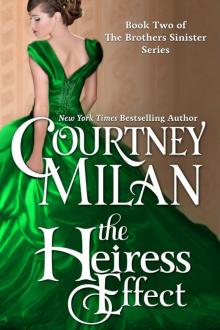 The Heiress Effect
The Heiress Effect Unraveled
Unraveled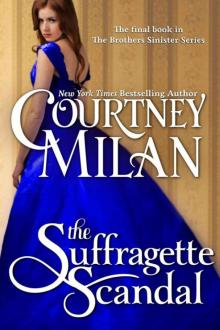 The Suffragette Scandal
The Suffragette Scandal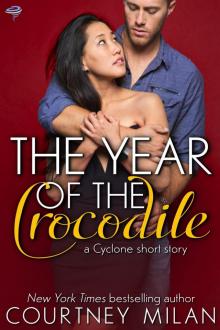 The Year of the Crocodile
The Year of the Crocodile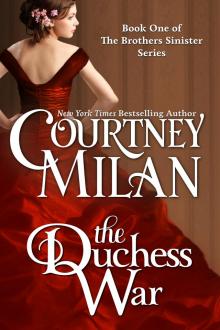 The Duchess War
The Duchess War What Happened at Midnight
What Happened at Midnight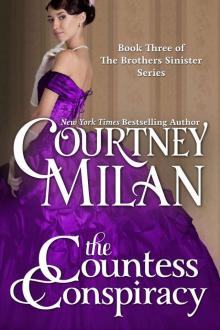 The Countess Conspiracy
The Countess Conspiracy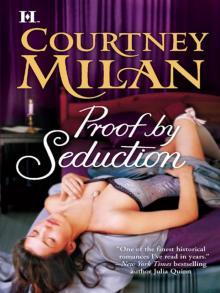 Proof by Seduction
Proof by Seduction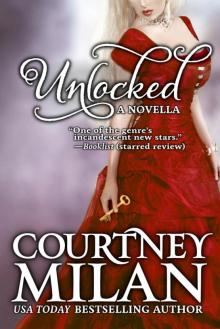 Unlocked
Unlocked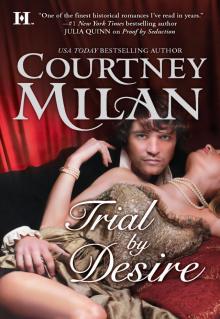 Trial by Desire
Trial by Desire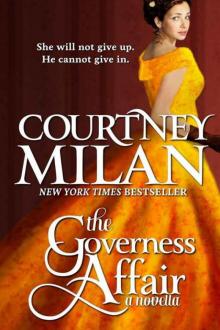 The Governess Affair
The Governess Affair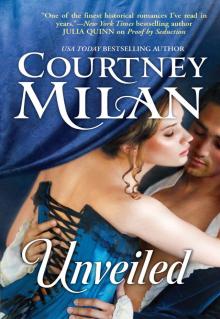 Unveiled
Unveiled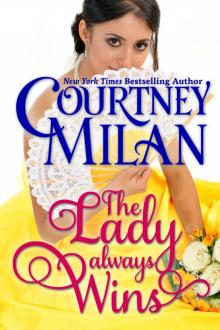 The Lady Always Wins
The Lady Always Wins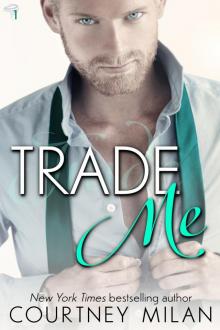 Trade Me
Trade Me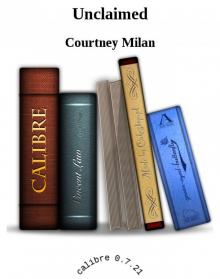 Unclaimed
Unclaimed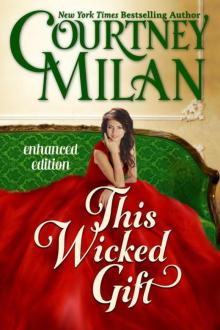 This Wicked Gift
This Wicked Gift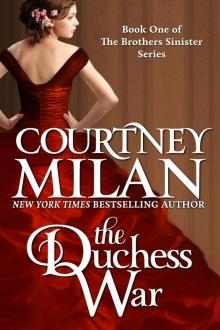 The Duchess War (The Brothers Sinister)
The Duchess War (The Brothers Sinister)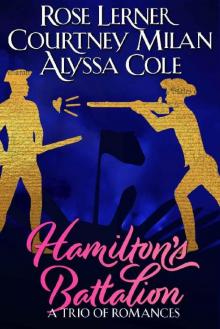 Hamilton's Battalion: A Trio of Romances
Hamilton's Battalion: A Trio of Romances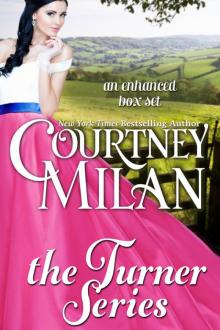 The Turner Series
The Turner Series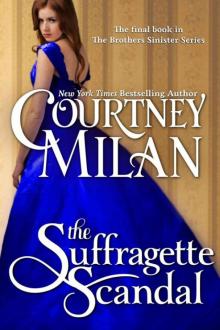 The Suffragette Scandal (The Brothers Sinister)
The Suffragette Scandal (The Brothers Sinister)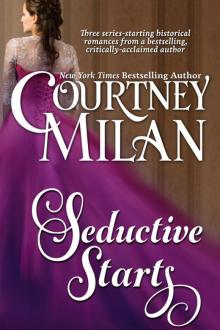 Seductive Starts
Seductive Starts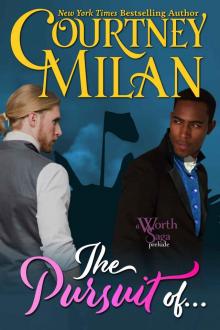 The Pursuit Of…
The Pursuit Of…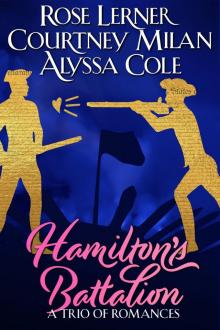 Hamilton's Battalion
Hamilton's Battalion The Carhart Series
The Carhart Series Seven Wicked Nights
Seven Wicked Nights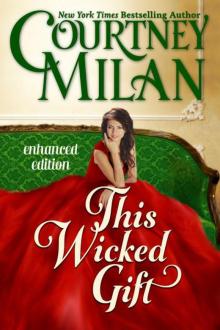 This Wicked Gift (A Carhart Series Novella)
This Wicked Gift (A Carhart Series Novella)